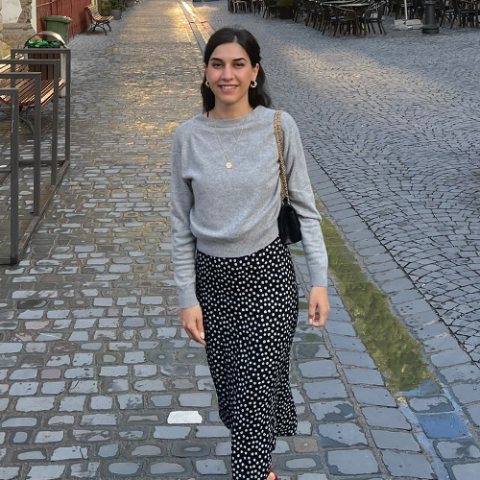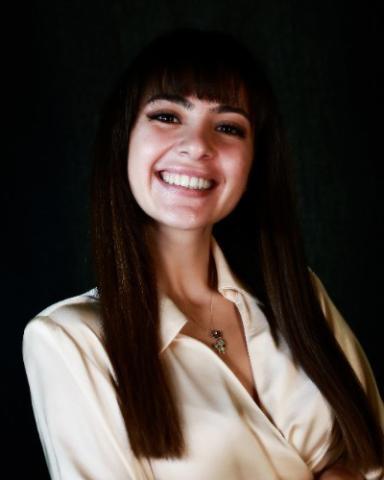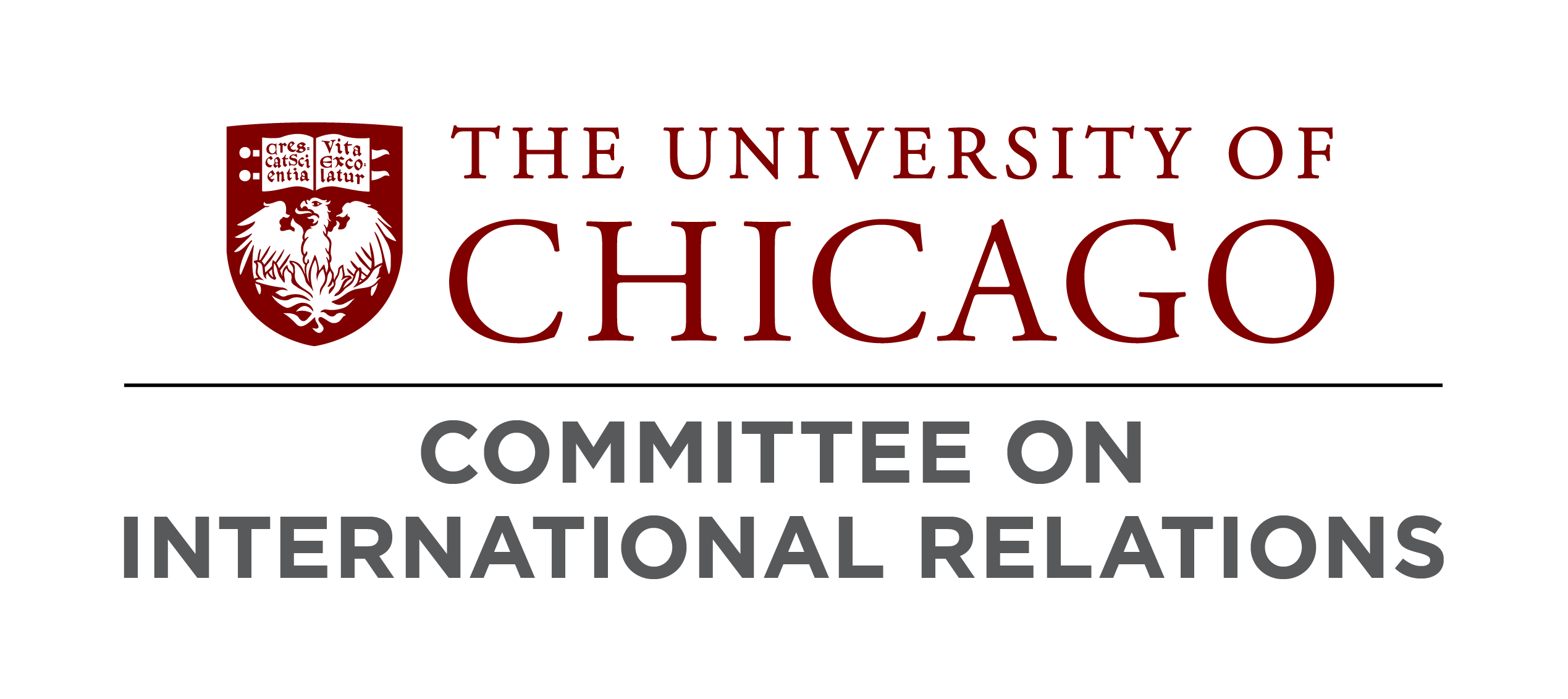Kiana Ashtiani Transcript
Iris Girgin, PhD student studying Political Science in the Social Sciences Division, talked with Kiana Ashtiani, CIR’13, about her passion for research, her experience at the University of Chicago’s CIR program, and how she is applying her skills today.

Iris: What brought you to UChicago?
Kiana: I attended UChicago's Committee on International Relations (CIR) in 2012, continuing my focus from my bachelor's in international relations with a concentration in politics and security. At CIR, I specialized in security issues, military and paramilitary relations with the state, and cross-border conflicts. I also explored the effectiveness of economic sanctions in conflicts, but my main focus was traditional international relations and security.
I initially intended to pursue a PhD, but that didn't happen for various reasons—though never say never! While I enjoyed the academic side, I was also keen to gain work experience, as I hadn't worked full-time between my undergrad and graduate studies.
Iris: Why did you choose CIR?
Kiana: UChicago’s stellar reputation, exceptional professors, and unique opportunities drew me. The community is also incredibly supportive. I still attend alumni events and stay connected with UChicago grads in my current work environment.
Another significant reason was the Institute for the Study of Ancient Cultures (ISAC) just across from Pick Hall. It’s a treasure trove of Middle Eastern culture. If you're Middle Eastern, you know the ISAC as it is a crucial part of our heritage, housing beautiful artifacts from the Middle East and preserving culture I didn't see growing up.
Iris: How did you transition from your master's program to the work you're doing now?
Kiana: After receiving my master's degree, I started working for the National Opinion Research Center (NORC) at the University of Chicago. So, in a way, I stayed within UChicago. NORC is a non-profit research firm with major contracts, primarily with the U.S. government. They conduct a lot of survey work, almost everything short of the actual census. They handle the jobs reports data, generational happiness statistics, and much more. If you've taken a stats class at UChicago, you've likely worked with data that NORC collected.
I chose this path because I loved the research aspect of my time at CIR and my master's program. I enjoyed learning about methodologies and practicing them, so I wanted to continue sharpening those skills. Even if I didn't pursue a PhD or work directly in policy, having a strong research background seemed invaluable. That's why I chose NORC over roles in policy in DC. I wanted to learn tangible, evergreen skills, which I found in survey research design, national and international data collection, and the complexities involved in those processes. I fell in love with that work.
Iris: What skills did you gain through CIR which you draw upon regularly in your work now?
Kiana: Three critical skills stand out -
First, the methodological course I took with my advisor, Paul Staniland, was incredibly helpful. It was like methods for your thesis, teaching different research methods. I had never done data collection before; all my undergrad work was secondary research. Conducting interviews for my thesis was eye-opening and somewhat scary. But it was a crucial experience, especially going through the ethics board process for approval, which taught me about rigorous research standards.
Second, the preceptor courses at CIR were invaluable. They drilled into us the importance of writing clearly and defining terms, as well as leading with your hypothesis and thesis. This made me a stronger problem solver and communicator, skills that are essential in the workplace.
Third, attending workshops taught me the importance of defining terms from the onset. It’s crucial for clarity and avoiding misunderstandings. This lesson has been incredibly useful in both academic and professional settings.
Iris: And what about your current role as in strategy for a market research firm?
Kiana: Interestingly, many people in my company studied international relations, and several are CIR grads. It’s a natural transition for many in our field. There’s no specific degree for market research, which often gets confused with marketing. It’s more about studying how markets operate, understanding which countries are conducive for a product, and grasping the socioeconomics and politics of those regions. You never know where your degree could lead you, so keep an open mind about career opportunities.
Iris: That is wonderful to hear that you get to work with other alumni.
Kiana: Absolutely. UChicago alumni are renowned for their sharp problem-solving and critical-thinking skills, which are highly valued in any workplace. The alumni network is incredibly supportive and helpful. For example, I recently reached out to a fellow alum in the strategy space, and it was fascinating to see how we both ended up in similar fields despite taking different paths. The community you build at UChicago is strong and enduring. Maintaining those relationships has been incredibly beneficial. I still attend alumni events and keep in touch with UChicago grads in my current work environment.
Iris: Was there a class that was particularly life-changing for you?
Kiana: Yes, the preceptor-led course on writing was transformative. It taught me how to structure my papers, start with my thesis, define my terms, and clearly lay out my hypothesis. This critical thinking and structured approach to writing have been incredibly valuable. Also, the methodology course with Paul Staniland taught me to use frameworks for problem-solving, a skill I still use today.
Iris: Did you face challenges during the program?
Kiana: Honestly, it wasn’t always easy, but I loved what I was studying, so it didn’t feel too challenging. When you’re passionate about something, it becomes enjoyable. The only challenge I recall was a course on the theory of religion, which had a humanities perspective, contrasting with my international relations background rooted in economics. This created a natural conflict in views, but it was still an interesting experience.
Iris: What advice would you offer prospective or current students?
Kiana: Be open-minded. Don’t discount courses on methodology and statistics. They are invaluable, even if you don’t realize it initially. Take advantage of these courses to find your passion, which might lead you in unexpected directions.
Also, be flexible with your plans. Sometimes, things don’t go as expected, but it might turn out for the best. Stay open to different career paths and opportunities. The skills you learn at UChicago, like critical thinking and problem-solving, are valuable in any field.

The alumni network is also a great resource. Reach out to fellow alums; they are usually willing to help and provide valuable insights. And don’t underestimate the importance of the connections and experiences you gain during your time at UChicago. They can have a lasting impact on your career and life.
Enjoy your time at UChicago, even though it has a reputation for being intense. It can be fun if you make it fun.
Iris: In what extracurricular activities were you involved?
Kiana: I was the social chair for our cohort. We organized fun events like baseball game trips and a trip to Medieval Times. Our cohort was tight-knit, and we enjoyed spending time together outside of classes. It was a lot of fun.
Favorite coffee place: Harper’s Coffee
Favorite food: I loved Nile, a Middle Eastern place I would order from when I was homesick.
A closing note from Iris: As an Anatolian, I find inspiration studying in ISAC’s beautiful library and wandering through its exhibits, which evoke a strong sense of home. It’s a place where history feels alive and personal. Through this conversation, I found out that I'm not the only one who feels this way.
 THE UNIVERSITY OF CHICAGO
THE UNIVERSITY OF CHICAGO

